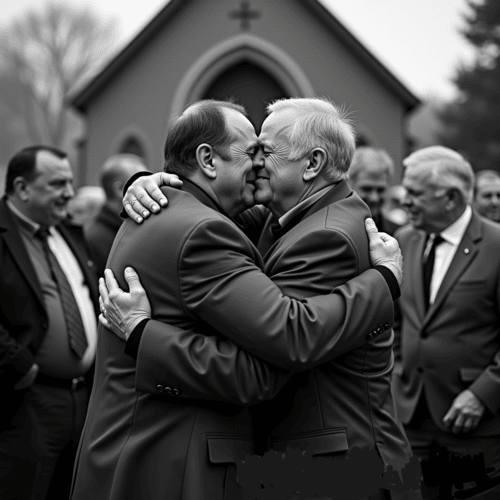What Are Spiritual Gifts and How Do I Find Mine? A Biblical Guide
Every believer in Jesus Christ has been sovereignly equipped by God with spiritual gifts—divine enablements designed for His glory and the church’s good. This isn’t spiritual speculation; it’s biblical truth. As Paul writes in 1 Corinthians 12:11, “All these are empowered by one and the same Spirit, who apportions to each one individually as he wills.” Understanding our spiritual gifts isn’t about discovering what makes us special—it’s about recognising how God has uniquely prepared each of us to serve His people and advance His kingdom.
WHAT SPIRITUAL GIFTS ACTUALLY ARE
Spiritual gifts are divine enablements given by the Holy Spirit to believers for ministry and service. They’re not natural talents (though God certainly uses those too), nor are they rewards for spiritual maturity. Rather, they’re expressions of God’s grace distributed according to His sovereign will.
Three key passages emphasise this truth.
- 1 Corinthians 12:4-7: Here Paul indicates both diversity and unity: “Now there are varieties of gifts, but the same Spirit… To each is given the manifestation of the Spirit for the common good.”
- Romans 12:6 grounds gifts in grace: “Having gifts that differ according to the grace given to us.”
- Ephesians 4:11-12 reveals their purpose: Christ “gave the apostles, the prophets, the evangelists, the shepherds and teachers, to equip the saints for the work of ministry.”
Notice the Reformed distinctives here: gifts are grace-based, not merit-based; they’re given for corporate edification, not personal glory; what’s more, they’re sovereignly distributed by the Spirit’s will, not human seeking. This foundation shapes how we understand and pursue spiritual gifts.
THE SPIRITUAL GIFTS: A BIBLICAL INVENTORY
Scripture provides several lists of spiritual gifts, each emphasising different aspects of Christian service:
- Romans 12:6-8 presents practical ministry gifts: prophecy, serving, teaching, encouraging, giving, leading, and showing mercy.
- 1 Corinthians 12:8-10 includes gifts of wisdom, knowledge, faith, healing, miracles, prophecy, discernment of spirits, tongues, and interpretation of tongues.
- 1 Corinthians 12:28 adds apostles, prophets, teachers, workers of miracles, healers, helpers, administrators, and speakers in tongues.
- Ephesians 4:11 focuses on leadership gifts: apostles, prophets, evangelists, and pastor-teachers.
Reformed cessationists recognise certain foundational gifts served specific purposes in the apostolic era. The offices of apostle and prophet were foundational to the early church (Ephesians 2:20), providing direct revelation until Scripture’s completion. Sign gifts like tongues, miracles, and healing primarily served to authenticate apostolic ministry (2 Corinthians 12:12). As Paul indicates in 1 Corinthians 13:8-10, these gifts would cease when “the perfect comes”—referring to the completion of revealed Scripture.
Reformed continuationists, while affirming the same foundational doctrines of grace and Scripture’s authority, maintain that all spiritual gifts continue today under Scripture’s authority. They argue that 1 Corinthians 13:8-10 refers to Christ’s return rather than canon completion, noting that we still see “in part” and “face to face” remains future. They distinguish between the unique apostolic office (which was foundational) and ongoing apostolic gifting for church planting and missions. Continuationists emphasise that all gifts must be tested by Scripture (1 John 4:1), operate in love (1 Corinthians 13), and serve the church’s edification (1 Corinthians 14:26), viewing miraculous gifts as ordinary means of God’s grace rather than merely authenticating signs.
However, the continuing gifts remain vibrantly active in today’s church: teaching, serving, encouraging, giving, leadership, mercy, evangelism, and faith. These gifts build up the body of Christ in every generation.
GOD’S PURPOSE IN SPIRITUAL GIFTS
Why does God give spiritual gifts? Ephesians 4:12-13 provides the answer: “to equip the saints for the work of ministry, for building up the body of Christ, until we all attain to the unity of the faith and of the knowledge of the Son of God.”
This reveals a three-fold purpose: equipping believers for service, building up the church body in love and unity, and bringing glory to God through faithful stewardship. Gifts aren’t about personal fulfillment or individual recognition—they serve God’s agenda. They’re designed to create beautiful interdependence within the church, as Paul illustrates in 1 Corinthians 12:14-26 with his body metaphor.
As Peter reminds us, “As each has received a gift, use it to serve one another, as good stewards of God’s varied grace” (1 Peter 4:10-11). Our gifts are expressions of God’s grace entrusted to us for the benefit of others.
HOW DO I IDENTIFY MY SPIRITUAL GIFTS?
So how do we discover our spiritual gifts? Scripture provides clear guidance for this process.
- First, examine your regenerate desires: Philippians 2:13 tells us “it is God who works in you, both to will and to work for his good pleasure.” What ministry burdens has God placed on your heart? Where do you sense His Spirit stirring you toward service? These sanctified desires often point toward your giftedness.
- Second, assess your Spirit-empowered effectiveness. Paul told the Corinthians, “you are my letter of recommendation” (2 Corinthians 3:2). Where has God blessed your service with genuine fruit? What ministry areas show clear evidence of divine enablement rather than mere human effort? Spiritual gifts typically produce results that exceed our natural abilities.
- Third, receive confirmation from the body. The church plays a vital role in recognising and affirming gifts. As Paul instructed regarding prophecy, “Let two or three prophets speak, and let the others weigh what is said” (1 Corinthians 14:29). What needs do mature believers consistently see you meeting? How has the church affirmed your service?
This process requires several biblical guardrails. Gift identification must remain Scripture-centred, aligning with biblical parameters rather than personal feelings. It requires church confirmation—where individual discernment meets corporate validation. It must stay Christ-focused, pointing to Jesus rather than self. And it should be character-grounded, as spiritual maturity accompanies authentic gifting.
Practically, this means studying the biblical gift lists prayerfully, serving faithfully in various capacities, seeking counsel from godly mentors, and paying attention to where God provides both effectiveness and joy in service.
FAITHFUL STEWARDSHIP OF OUR GIFTS
Discovering our gifts is only the beginning. Jesus’ parable of the talents (Matthew 25:14-30) emphasizes faithful stewardship over spectacular display. The master’s commendation—“Well done, good and faithful servant”—goes to those who use their gifts wisely, not necessarily those with the most dramatic results.
Scripture provides clear guidelines for gift usage. Use them in love—1 Corinthians 13:1-3 warns that without love, even the most impressive gifts are meaningless noise. Use them for edification—Paul’s rule in 1 Corinthians 14:26 is that “all things must be done for building up,” never for tearing down. Use them under proper authority—gifts operate within the ordered structure of church life (1 Corinthians 14:40). And use them with humility, recognizing that gifts are unmerited expressions of God’s grace (1 Peter 5:5).
LIVING OUT OUR DIVINE CALLING
God has uniquely gifted every believer for His sovereign purposes. Our spiritual gifts aren’t accidents or afterthoughts—they’re integral to His design for our lives and His church. Whether we’re gifted in teaching, serving, encouraging, giving, or leading, faithful stewardship of these gifts brings glory to God and genuine blessing to His people.
The goal isn’t to discover the most impressive gift or to compare our giftedness with others. It’s to faithfully use what God has given us for His glory. As Paul concludes in 1 Corinthians 10:31, “So, whether you eat or drink, or whatever you do, do all to the glory of God.”
Our spiritual gifts are God’s grace at work through us. We’re to discover them through Scripture, develop them through service, and deploy them for His kingdom. The church needs what God has given us—and we need what He has given others. And collectively, we form the beautiful, diverse, unified body of Christ.
WHAT ARE SPRITUAL GIFTS? RELATED FAQs
Can spiritual gifts change or develop over time? Yes, spiritual gifts can develop and mature as we grow in Christ, though our core gifting typically remains consistent. John Stott discovered his teaching gift gradually—first through leading Bible studies at Cambridge, then realising his passion for expository preaching deepened with pastoral experience. Many believers find their gifts become more refined and effective as they gain wisdom, but the fundamental areas where God has gifted them usually emerge early in their Christian walk.
- What’s the difference between spiritual gifts and the fruit of the Spirit? Spiritual gifts are specific abilities for ministry and service, while the fruit of the Spirit (Galatians 5:22-23) represents Christian character that all believers should display. RC Sproul often explained it this way: gifts are what you do for God’s kingdom, while fruit is who you are in Christ. Every Christian should exhibit love, joy, peace, and patience, but not every Christian has the gift of teaching or administration.
- How did prominent theologians discover their spiritual gifts? John Piper recognised his preaching gift when he felt “explosion of joy” preparing sermons in seminary, realising exposition brought him alive in ways academic theology alone couldn’t. Tim Keller discovered his evangelistic and church-planting gifts through seeing consistent conversions in his ministry and sensing unusual burden for reaching secular urbanites. Sinclair Ferguson identified his teaching gift when he found himself naturally breaking down complex theological concepts for others and seeing genuine understanding dawn in their eyes.
Can one have multiple spiritual gifts? Absolutely—most mature believers operate in several complementary gifts. John MacArthur demonstrates both teaching and leadership gifts in his pastoral ministry. The key is that one gift usually predominates as your primary calling. Paul himself exhibited multiple gifts: apostleship, teaching, church planting, and evangelism, though his apostolic calling was central to his identity and ministry.
- What if I’m struggling to identify any spiritual gifts? This is common, especially for new believers or those who haven’t had opportunities to serve. Martyn Lloyd-Jones counselled that gifts often emerge through faithful service in small things first. Start serving wherever there’s need in your church—children’s ministry, hospitality, administration—and pay attention to where you sense God’s blessing and others affirm your contribution. Sometimes what feels “natural” to us is actually supernatural gifting we take for granted.
- Should spiritual gifts influence my career choices? While spiritual gifts primarily concern church ministry, they can certainly inform vocational decisions. John Frame pursued academic theology partly because his teaching gift aligned with scholarly work. However, our spiritual gifts aren’t necessarily our career—many gifted teachers work in business while teaching Sunday school, and many with mercy gifts serve professionally in law while ministering to hurting people in their spare time. The key is faithfully using our gifts for kingdom purposes regardless of our job.
How do spiritual gifts relate to church membership and commitment? Spiritual gifts are given specifically for the local church body, making committed church membership essential for their proper exercise. As Westminster divine Richard Baxter emphasised, gifts are meant to function within the ordered life of a particular congregation under pastoral oversight. JI Packer argued spiritual gifts create both privilege and responsibility—we need the church to exercise our gifts properly, and the church needs our gifts to function as God intended. Lone-ranger Christianity frustrates God’s design for spiritual gifts.
WHAT ARE SPRITUAL GIFTS? OUR RELATED POSTS
- Walk by the Spirit Daily: What Does It Actually Look Like?
- The Holy Spirit’s Indwelling: How Can I Be Sure I Have It?
- When Words Fail: How the Holy Spirit Helps Us in Our Prayers
- The Inner Witness: How the Holy Spirit Assures Us of Sonship
- What Does It Mean to be Baptised in the Holy Spirit?
- What Does it Mean to Grieve the Holy Spirit?
Editor's Pick

Is the Bible God’s Word? Or Does It Only Contain God’s Word?
The authority of Scripture stands at the crossroads of modern Christianity. While some argue the Bible merely contains God’s Word [...]

Will We Remember This Life in Heaven? What Isaiah 65:17 Means
"Will I remember my spouse in heaven? My children? Will the joy we shared on earth matter in eternity?" These [...]

From Empty to Overflow: The Abundant Life Jesus Promised
(AND WHY YOU SHOULDN’T SETTLE FOR LESS) We're surviving, but are we thriving? If we're honest, there's a gap between [...]

What Does Jesus Save Us From?
THREE BIBLE TRUTHS ABOUT SALVATION "Jesus saves." We’ve seen it on bumper stickers, heard it shouted at sporting events, maybe [...]

If God Wants Everyone Saved, Why Aren’t They?
THE REFORMED VIEW ON GOD’S DESIRE VS HIS DECREE The question haunts every believer who has lost an unbelieving loved [...]

The One Man Mystery in Acts 17:26: Is It Adam Or Noah?
When the Apostle Paul stood before the philosophers at Mars Hill, he delivered an insightful statement about human unity: “And [...]

Megiddo Or Jerusalem: Where Did King Josiah Die?
Recent archaeological discoveries at Tel Megiddo continue to reveal evidence of Egyptian military presence during the late 7th century BC, [...]

Losing Your Life Vs Wasting It: How Are the Two Different?
AND WHY DID JESUS PRAISE THE FORMER? Jesus spoke one of the most perplexing statements in Scripture: “For whoever wants [...]

Can Christians Be Demon Possessed? What the Bible Teaches
Perhaps you’ve witnessed disturbing behavior in a professing Christian, or you’ve struggled with persistent sin and wondered if something darker [...]

Sacred Fury: What Christ’s Temple Cleansing Truly Means
Mark 11 records the crack of a handmade whip that echoed through the temple corridors. Tables crashed to the ground, [...]
SUPPORT US:
Feel the Holy Spirit's gentle nudge to partner with us?
Donate Online:
Account Name: TRUTHS TO DIE FOR FOUNDATION
Account Number: 10243565459
Bank IFSC: IDFB0043391
Bank Name: IDFC FIRST BANK






